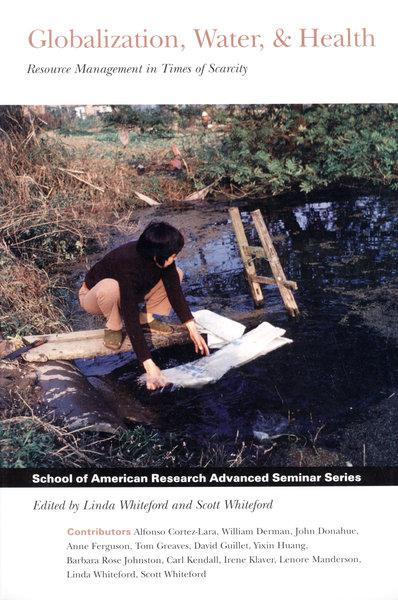Globalization, Water, & Health
Resource Management in Times of Scarcity Edited by Linda Whiteford and Scott Whiteford This book is about crime and passion, life and death, lofty goals and squalid realities. It is a book about water. Global disparities in health and access to water are two major threats to world stability. As international contracts and corporate agreements divert water from small communities to provide for larger cities, from households to supply agribusiness, conflicts sharpen among local communities, national governments, and international agencies such as the World Bank and the International Development Bank over the basic resources to support human life. In this book, leading anthropologists illuminate the global political inequities and resource management techniques that cause children to die and adults to sicken. Drawing on expertise in medical and ecological anthropology, the contributors challenge and deepen our understanding of the management, sale, and conceptualization of water as it affects human health. Designed for use by policymakers as well as researchers and students, the essays present complex realities in clear, accessible terms. 2005. 336 pp., 12 black-and-white illustrations, 2 tables, notes, references, index, 6 x 9 Contributors: Alfonso Cortez-Lara, William Derman, John Donahue, Anne Ferguson, Tom Greaves, David Guillet, Yixin Huang, Barbara Rose Johnston, Carl Kendall, Irene Klaver, Lenore Manderson, Linda M. Whiteford, Scott Whiteford Download an excerpt.
“This is a strong piece of scholarly work that explores a number of pressing water-related health issues and will be of interest to people working in a variety of scholarly and applied fields: medical anthropology, environmental anthropology, international health and development, and water management.”
—Dr. Michael Ennis-McMillan, Skidmore College
“This volume traces a trail of failed water policies and local responses to plans from on high, a trail leading from parched villages and fouled slums to the policy boardrooms of Washington and New York and the capital cities of a dozen nations.…The reader learns how precarious is our right to clean water.…Most of the world’s thirsty, or those obliged to drink unsafe water, will not be able to read this book. It’s in the interest of the rest to make sure that policy makers do, since the health of billions is at stake.” —Paul Farmer, Partners in Health, Harvard Medical School
“[T]his is an important volume, highlighting the importance of anthropological contributions to a critical dimension of globalization, resource access and use, and health. The focus on water … is in this volume situated in novel ways in the context of history, globalization, the role of the state, policy analysis, epidemiology, and medical anthropology… The authors of this volume are to be commended for… showing how specific dimensions of globalization – economic, social, and cultural – impair water security and threaten human health.” —Craig Janes, The Journal of the Royal Anthropological Institute Vol. 12, no. 4 (December 2006)
“This volume traces a trail of failed water policies and local responses to plans from on high, a trail leading from parched villages and fouled slums to the policy boardrooms of Washington and New York and the capital cities of a dozen nations.…The reader learns how precarious is our right to clean water.…Most of the world’s thirsty, or those obliged to drink unsafe water, will not be able to read this book. It’s in the interest of the rest to make sure that policy makers do, since the health of billions is at stake.” —Paul Farmer, Partners in Health, Harvard Medical School
“[T]his is an important volume, highlighting the importance of anthropological contributions to a critical dimension of globalization, resource access and use, and health. The focus on water … is in this volume situated in novel ways in the context of history, globalization, the role of the state, policy analysis, epidemiology, and medical anthropology… The authors of this volume are to be commended for… showing how specific dimensions of globalization – economic, social, and cultural – impair water security and threaten human health.” —Craig Janes, The Journal of the Royal Anthropological Institute Vol. 12, no. 4 (December 2006)
- Paradigm Change Linda Whiteford and Scott Whiteford
- Casualties in the Globalization of Water: A Moral Economy of Health Perspective Linda Whiteford
- Water Reform, Gender, and HIV/AIDS: Perspectives from Malawi Anne Ferguson
- Water, Vectorborne Disease, and Gender: Schistosomiasis in Rural China Lenore Manderson and Yixin Huang
- Waste Not, Want Not: Grounded Globalization and Global Lessons for Water Use from Lima, Peru Carl Kendall
- Whose Water Is It Anyway? Boundary Negotiations on the Edwards Aquifer in Texas Irene Klaver and John Donahue
- The Commodification of Water and the Human Dimensions of Manufactured Scarcity Barbara Rose Johnston
- Water Struggles of Indigenous North America Tom Greaves
- Water Management Reforms, Farmer-Managed Irrigation Systems, and Food Security: The Spanish Experience David Guillet
- The Incredible Heaviness of Water: Water Policy and Reform in the New Millennium in Southern Africa William Derman
- Good to the Last Drop: The Political Ecology of Water and Health on the Border Scott Whiteford and Alfonso Cortez-Lara
- Concluding Comments: Future Challenges Scott Whiteford and Linda Whiteford
There are no working papers for this book at the present time.
